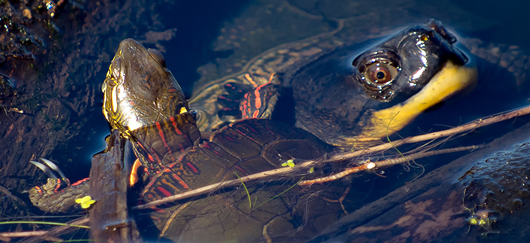
Climate change presents a serious threat to biodiversity – across the planet and right here at home.
Scientists are telling us:
This month, the Government of Ontario has launched public consultations on how carbon offsets may be made available to carbon polluters who are unable to achieve their required greenhouse gas (GHG) pollution reductions. The government’s proposals include the potential for more intensive management interventions to increase carbon sequestration, which could significantly impact Ontario’s biodiversity.
Our forests, wetlands, lakes are important components of carbon cycling. But now these natural carbon stocks are threatened by human-caused climate change. In many cases, an increase in the number and intensity of forest fires, droughts and rising temperatures are expected to release more carbon into the atmosphere.
The stakes are high. Ontario’s ecosystems may be put up for auction and commodified in a new way – namely their ability to absorb and store carbon may be traded to allow more carbon pollution elsewhere.
Will the Province ensure species and their habitats are protected? Or will carbon offsets become a way for industrial users to exploit even more natural resources under the guise of protecting the environment? Ontario’s cap and trade system must do the following:
- Protect biodiversity in a time when human-caused climate change is harming many species. Fires, invasive species and storms are going to increase pressure on many vulnerable species, changing important habitat features and disrupting their life cycles. Don’t push them out. Protecting habitat needs to be a key component of any cap and trade system.
- Avoid jeopardizing natural landscapes through uncertain climate change mitigation strategies. We need to maintain representative ecosystems unmodified by industrial-scale human activities in order to provide a baseline to monitor how climate change is impacting our ecosystems.
- Achieve real, additional and permanent increases in carbon storage that exceed what would be achieved through ‘business as usual’ scenarios. Carbon polluters cannot simply purchase ‘credits’ for activities that are already being undertaken in another sector.
- Ensure Free, Prior and Informed Consent (FPIC) of affected Indigenous communities before any carbon offset program goes ahead. Indigenous rights to carbon sequestered within traditional territories need to be recognized in the face of emerging climate change policies and laws.
Please join us in calling for a cap and trade system that safeguards Ontario’s wild species and spaces by the December 30, 2016 deadline. Be sure to reference Environmental Registry #012-9078.
Sample sign on letter:
Dear Minister Murray,
I support the government’s intent to tackle climate change, which is a serious threat to all life across the planet and right here in Ontario. As you move forward with the development of the Province’s cap and trade program, I urge you to fully consider and address the need to protect and recover Ontario’s biodiversity (EBR# 012-9078).
Specifically, I ask that you:
1. Protect species habitat as a key component of the cap and trade system.
2. Avoid jeopardizing natural landscapes through uncertain climate change mitigation strategies.
3. Achieve real, additional and permanent increases in carbon storage that exceeds what would be achieved through ‘business as usual’ scenarios.
4. Ensure Free, Prior and Informed Consent (FPIC) of affected Indigenous communities.
Photo credit: Brent Eades